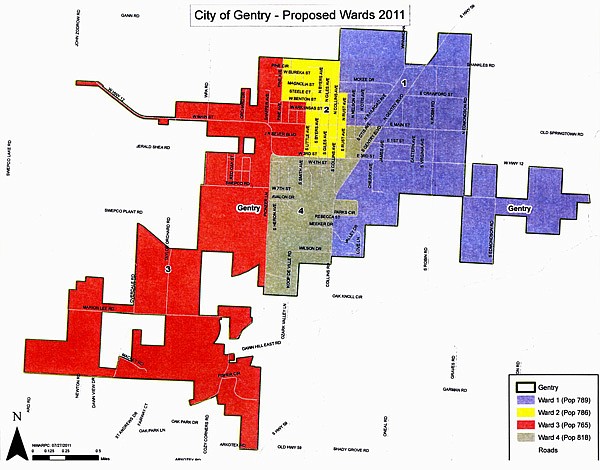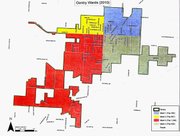Gentry council to set new ward boundaries
City Council required to equalize ward populations by adjusting ward boundaries.
The above chart, prepared by the Northwest Arkansas Regional Planning Commission, shows new proposed ward boundary lines which would equalize population numbers among Gentry's four wards.
Wednesday, August 31, 2011
GENTRY — With the results of the 2010 Census, Wards boundaries will have to be adjusted in the city to comply with state law.
Under Arkansas statute A.C.A. 14-43-311, cities of the first class are required to ensure wards are as equal in population as possible, and courts have generally limited population deviations between wards to a maximum of 10 percent.
Using the 2010 ward boundaries and the new census figures, the ward populations in the city were as follows: Ward 1 - 384; Ward 2 - 867; Ward 3 - 1,348; Ward 4 - 559; Total population - 3,158.
In order to equalize populations within each of Gentry’s four wards, the Northwest Arkansas Regional Planning Commission is proposing a change in boundaries which would equalize populations and also leave elected aldermen representing wards within the ward they were elected to serve.
Under the proposed change, ward populations would be as follows: Ward 1 - 789; Ward 2 - 786; Ward 3 - 765; and Ward 4 - 818. The proposed ward boundary changes are illustrated in the printed ward maps.
According to Gentry mayor Kevin Johnston, the city requested the proposed changes already last spring so that it could pass an ordinance to comply with the law.
Now that the proposed changes have been received, the council will take up a proposed ordinance to make the needed adjustments.
Of concern to some alderman are islands and near-islands of land encircled by the city which could be annexed to square-up city borders.
Others, including Johnston, believe that it would be betterin most cases not to force annexation on property owners but to take in those properties where landowners petition to be annexed into the city.
Of concern to some residents whose ward will be changed is that they were not, in the last election, given opportunity to vote for the aldermen in their newly-designated wards.
The council is expected to address the ward changes at its next regular meeting on Sept. 12.
Ward population figures and proposed boundary changes used in this article were submitted to the city by Jeff Hawkins, Northwest Arkansas Regional Planning Commission director.
The Law: 14-43-311. Redistricting of wards.
(a) (1) (A) City councils in cities of the first class shall have the authority to redistrict the wards in their city when they determine that the people can best be served by adding wards, combining wards, or changing wardboundary lines to equalize the population in the various wards.
(B) It shall be the duty of the council to see that each ward has as nearly an equal population as would best serve the interest of the people of the city.
(2) (A) Within ninety (90) days after redistricting, if one hundred (100) or more qualified electors in the city are dissatisfied with the redistricting of the city into wards, they shall have the authority to petition the circuit court.
(B) The court, after due hearing, shall have authority to redistrict the city into such wards as the court shall deem best if the court finds that the redistricting action by the council was arbitrary and capricious.
(b) At the next city election held, more than twenty (20) days after the approval of redistricted wards, there shall be elected from each of the new wards two (2) aldermen who shall organize the new city council at the first council meeting in January after their election.
(c) (1) (A) All aldermen elected in the city prior to redistricting of wards shall give up their positions to the new aldermen at the time for the organizationof the new council, as provided in subsection (b) of this section.
(B) From that date the terms of office of all previously elected aldermen shall cease and terminate.
(2) (A) It shall be lawful to increase the number of wards or continue the same number of wards without affecting the terms of office of incumbent aldermen of the city.
(B) (i) When the wards are reapportioned so as to increase the number of wards or readjust existing wards so that such wards contain nearly equal population, the aldermen who remain in their old ward, or part thereof, shall continue in office.
(ii) New aldermen shall be elected only for new wards actually formed out of the territory of old wards.
(d) (1) All clerk's costs and other costs incurred in the proceedings authorized in this section shall be paid by the persons at whose instance the services were rendered.
(2) (A) In case these proceedings result in the redistricting of the city into new wards, the compensation of those individuals making the redistricting shall be fixed by the circuit judge, certified to the city council, and paid out of the city treasury.
(B) This compensation shall not exceed the sum of twentyfive dollars ($25.00) each.
News, Pages 1 on 08/31/2011

